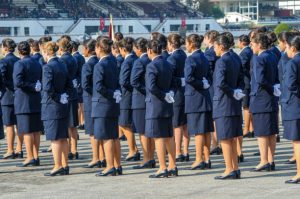
[iStock]
No matter how much experience you have, joining a CCA can be scary.
If you want to know more about different CCAs before choosing one, you’ve come to the right place.
There are a few types of CCAs and each type has its own benefits, but what exactly are those benefits?
Groups of CCAs

[iStock]
There are four CCA groups according to the Ministry of Education (MOE):
1) Physical Sports
2) Clubs and Societies
3) Uniformed Groups
4) Visual and Performing Arts
Physical Sports include CCAs like Track and Field, hockey, and table tennis.
Clubs and Societies include CCAs like Art Club, Debate Club, and Environment (or sometimes called Green) Club.
Uniformed Groups include St John Brigade, National Police Cadet Corps (NPCC), and Red Cross Youth (RCY).
Visual and Performing Artsinclude musical groups like Symphonic Band or Strings Ensemble and dance clubs like Modern and Chinese Dance.
Physical Sports

[iStock]
There are many, many benefits to joining a sport. In most sports, you will train your reflexes, which reduces the risk of sustaining injury. You will also train your physical fitness, which is good for your overall health and gives you an extra boost during NAPFA.
In sports CCAs, you will often develop strong bonds with other CCA-mates due to the gruelling training sessions you have to go through together. You will be making many new friends and gaining teamwork skills, especially in team sports.
Since practice is essential to getting better at your sport, you will likely be doing certain things over and over again just to get better at it.
That, coupled with the physical training you will no doubt have to go through, means that you will be gaining a lot of resilience. If you can make it through hours of such tiring activity two to three times a week, you will definitely come out better for it.
Clubs and Societies

[iStock]
Clubs and Societies CCAs will equip you with a new skill or enhance the ones you already have. These skills are useful for both school and use in the workplace.
For example, on the debate side, English Literary Drama and Debate Society (ELDDS) teaches you how to think critically and present your argument in a convincing and confident way. This is useful for presentations and pitches, or even just argumentative essays.
They also teach presentation skills because of the performances and drama aspect and teach members to overcome their stage fright.
Art Club teaches art skills and some clubs such as Infocomm Club teach you how to make the best use of the technology they have at hand. Environment Club teaches you about environmental issues and can also teach you crafts when it comes to recycling.
All Clubs and Societies’ CCAs teach you their own unique things and allow you to expand your interests while you’re at it.
Uniformed Groups

[iStock]
Uniformed Groups (known colloquially as UGs) require a lot of dedication and discipline, and if you don’t have the latter, it will often be trained into you.
The physical training in some UGs can be as gruelling as that of Physical Sports CCAs, so your fitness will be improved. UGs also often have camps, so you will be learning a lot of practical life and survival skills.
In addition to those, you will learn first-aid skills and the spirit of helping others, especially in the St John Brigade, where first-aid is the main thing you learn.
There will also be many chances for you to improve your leadership skills since you can be a part of planning the CCA events and camps.
Visual and Performing Arts

[iStock]
One of the main things you learn from joining a Performing Arts CCA is teamwork and collaborative skills.
You have to train with a large group of people to present the audience with one single performance. Working together to produce something will help you forge strong bonds between you and your CCA-mates.
Because the performance dates can be close to each other (taking into account performances for the school as well), you will have to practise a lot, sometimes even outside of CCA time. You will learn how to manage your time well because of this.
You will also learn the skills needed to perform in your CCA, whether it’s playing a string instrument or singing for the choir.
Conclusion

[iStock]
Every type of CCA has its own pros and cons. You should also remember to think about what you will enjoy when choosing a CCA—most CCAs have or will arrange competitions of some sort so you’re not missing out on any CCA points.
Now that the benefits of each type of CCA have been highlighted to you, I hope it helps you narrow down your choices when picking your CCA!
If you enjoyed this article, why not also read:
